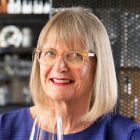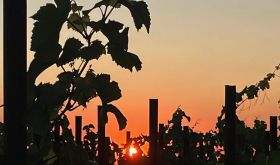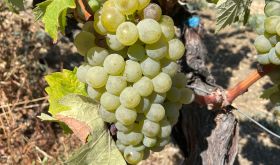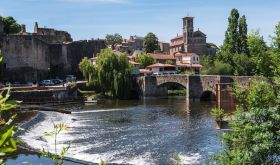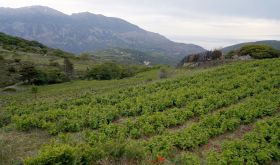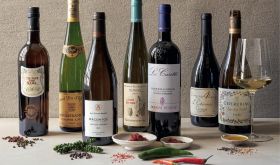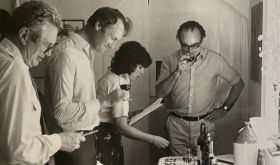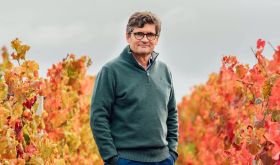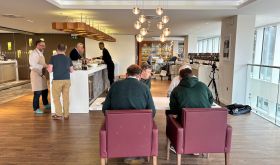The most significant woman in wine is woefully under-publicised. I mentioned her name to the well-connected head of one of her company’s UK importers and it meant nothing. Barbara Banke (pronounced ‘Banky’ thanks to a Danish antecedent) is the widow of the feisty California lawyer Jess Jackson, who founded a business empire on the hugely successful Kendall-Jackson Vintner’s Reserve Chardonnay brand. Its touch of sweetness, rumoured to have been accidental initially, offered American wine drinkers just what they were looking for in the 1980s. Since then the wine has become gradually more sophisticated but it is the only wine in the world that is fermented in 100,000 barrels each year, many of them originating from the company’s own stave mill in France. Banke has transformed the company into a leader of sustainability in wine that now has about 50 brands, premium operations in eight countries and a workforce that adores ‘Barbara’.
An Angeleno whose weekend entertainment was forays into wine country when qualifying as a lawyer at Hastings College in San Francisco, she met Jackson in the courtroom in 1978. Six years later they were married and had three children, all of whom are now involved with Jackson Family Wines (JFW), as are Jess Jackson’s two daughters from his first marriage and their progeny, bringing the total number of family members with a role in the company to 13 so far.
Jackson was the front man but Banke was already so effectively involved in the wine company that when he died in 2011 the transition to her being chairman and proprietor was, according to CEO Rick Tigner, who has been with the company since 1991, ‘seamless’.
In 2003, she told me last month when, as usual, she came to England for Royal Ascot, ‘Jess was driving me crazy with his micromanaging, deciding which assistants were assigned which cubicle in which wine company, that I told him to go get a hobby’. He took up racehorse breeding. She followed suit. Two years ago she became the first woman elected chairman of the prestigious Breeders’ Cup in the US, thanks to the extraordinary achievements of the thoroughbreds bred on her Stonestreet Farms in Kentucky. Curlin for instance was twice American Horse of the Year, and the highest-earning ever on his retirement in 2008, and has gone on to sire a succession of winners. And as Banke left her first Ascot in 2016, dashing to get to her son’s wedding at their Tenuta di Arceno Tuscan estate, Stonestreet-bred Lady Aurelia had performed so brilliantly that she was called on her cellphone by a Middle Eastern breeder offering three million dollars for the filly. Banke declined.
When I spent a day with her at Ascot last month it was clear that she knows and cares just as much about racing as our late Queen (with whom at a polo match not that long ago she discussed mutual matters equine). A major difference however is that Banke’s empire is still expanding, to the tune of more than $150 million spent on its development during the last five years alone.
Jackson Family Wines’ recently announced foray into English wine production is just the latest in a succession of expansion plans. Banke and her older daughter Julia, for instance, have acquired two wineries on Vancouver Island, not well known as a wine region but cannily chosen because it’s more temperate than British Columbia’s established wine country.
Jess Jackson left a legacy of highly regarded wine estates in Napa Valley and, especially, Sonoma, where the company is based. All three Jackson children live within two blocks of each other in the pretty Sonoma town of Healdsburg, with Banke herself and her youthful 95-year-old mother not far away.
But since then, in another move designed to challenge global warming, they have taken a major punt on cooler, wetter Oregon to add to their properties in Monterey, Mendocino and Santa Barbara counties. Projects too recent to have made it on to the company website include a venture in Washington state’s Walla Walla and a Sancerre and Loire Chenin Blanc called Passerelle that will be launched next year.
In South America Jess Jackson took the company into now-fashionable Maule in southern Chile way back in 1993, at a time when the major Chilean producers hardly knew where it was. His Tapiz venture in Argentina was less successful. ‘Argentina was a disaster’, admitted Banke with her throaty laugh. ‘The wines were good, but the currency was horrible. We sold Tapiz in the mid 2000s – it was all just too tough.’
A much earlier French adventure, Ch Lassègue in St-Émilion, Bordeaux, was another of Jess Jackson’s projects, in conjunction with French vigneron Pierre Saillan, whom he recruited to create the acclaimed Vérité estate in Sonoma. According to Tigner, Jackson was convinced Ch Lassègue was the equal of the best of St-Émilion and would have been horrified that it took until last year for it to be officially classified as a grand cru. Banke is much more low-key – quiet actually, and a good listener with a slightly sardonic sense of humour – but is clearly motivated by strong personal instinct.
She, and especially her son Christopher and his wife Ariel, love England and have long been keen to move into vine-growing there. Banke also has a particular fondness for South Africa and is hugely proud of their Capensis Chardonnay grown on some of the most admired land in Stellenbosch in a project overseen by South African Graham Weerts, who also runs JFW’s Stonestreet Vineyards in Sonoma.
One signature of the group is the extraordinary level of autonomy given to each estate so that the big-company ethos, so evident and often crippling in other big wine enterprises, seems entirely absent. This despite the fact that Tigner estimates they produce more than a thousand SKUs in any given year, and own about 14,000 acres (over 5,600 ha) of prime vineyard.
JFW recently added a third Australian winery, Giant Steps, to the McLaren Vale organic pioneer Yangarra and historic Hickinbotham. Banke recruited Melanie Chester, chief judge of the Melbourne Royal Wine Awards, as new winemaker at Giant Steps, a Yarra Valley property that already enjoyed a fine reputation, by asking her whether she sincerely wanted to continue to improve the wines. ‘She loves great properties’, Chester assured me about Banke, who admits that her legal training (she has no formal wine training) is awfully useful in her continual quest to expand the empire. When she said, ‘I love Burgundy’, I realised she was referring not to the wine but to her dream of acquiring land there. ‘We should have some, but it’s so expensive. Never mind, we’ll work around it. Between the UK, Oregon, Canada and Giant Steps, we’ll make a similar style of wine.’
So where next? In my pre-Ascot hour with her in the elegant drawing room of Farleigh House outside Basingstoke that she now rents each June, Piedmont, Germany and Tasmania were all mentioned. ‘I’m not a big fan of jammy, over-extracted, Mega Purple sorts of wine’, she made clear, referring to the notorious grape-concentrate colouring additive, adding, ‘but my palate has evolved over the years’.
It was in the early years of this century that JFW began their leadership in sustainability, initially auditing and then limiting the chemical inputs on each estate. They are now engaged in a wide range of schemes including regenerative viticulture, lightweighting their bottles, recycling waste water, eliminating non-native species and introducing livestock on their estates.
In 2019 JFW founded, with the Catalan Torres family winemaking operation, International Wineries for Climate Action, a growing band of wine producers committed to reducing their carbon emissions. Julia Jackson’s main focus is Grounded, designed to limit the effects of climate change, not just on the wine industry. (She’s especially keen on moving JFW’s vineyards towards the poles.) Both initiatives have been inspired by the devastating Sonoma fires of 2017 which left many Jackson employees, and some family members, homeless, prompting Banke to acquire a nearly finished apartment block that was ready for her workers to move into within two weeks. ‘People before profit’, Tigner assured me on the journey back to London from Ascot. ‘She’s amazing, and what she really wants is to travel and have fun.’
Ariel Jackson has been leading a scheme to clear local forests and eliminate flammable materials to fireproof their properties. Katie Jackson has been responsible for the company’s sustainability credentials, and for government relations. Her husband Shaun Kajiwara is the company’s vineyard director and has started a farm-labour contractor that brings in legally documented workers from Mexico. ‘It’s been very good for us’, says Banke, who is all too aware of the problems associated with agricultural labour.
As a sideline, with her good friend Peggy Furth, another Sonoma wine widow (Chalk Hill), and some scientific research, Banke has devised Vine to Bar, a chocolate bar made from Chardonnay pomace that apparently contains ‘beneficial nutrients’. Sounds too good to be true.
So do I have a criticism of this marvel who claims to be such a top performer by simply hiring the right people? Only, I suppose, the extent that she depends on her private plane, which seems at odds with such a commitment to sustainability. Her defence is that ‘private aviation accounts for under 2% of our total emissions, and while this is a small number, we continue to be more conscientious about the use of private aviation. We support and promote the use of SAF (sustainable aviation fuel) at our home-based airport and abroad where possible.’
Banke will turn 70 in August and is planning three parties: one with the family in Sonoma, one in Kentucky ‘with horsey people’ in September, and perhaps one in New York. Her long-standing international advisor Nick Bevan added, ‘and maybe a celebration in London, because she loves a pub crawl’.
Favourite JFW wines available in the UK
Whites
Yangarra, Blanc 2022 McLaren Vale 12.5%
£19.29 (2021) All About Wine
Giant Steps Chardonnay 2021 Yarra Valley 12.5%
From £22 from multiple stockists
Cambria, Katherine’s Vineyard Chardonnay 2019 Santa Maria Valley 13.9%
£27.99 Majestic (£22.99 if six mixed bottles are bought)
Giant Steps, Tarraford Vineyard Chardonnay 2022 Yarra Valley 13%
£31.10 VINVM, £35 (2021) The Good Wine Shop, £36.70 Hedonism
Capensis, Silene 2019 Stellenbosch 14%
£46.50 Fareham Wine Cellar, £60 Hedonism
Reds
Yangarra, Noir 2021 McLaren Vale 14%
£19.29 (2019) All About Wine
Edmeades Zinfandel 2019 Mendocino 15%
£19.25 VINVM, £20.99 Paul Adams Fine Wines
Yangarra, Old Vine Grenache 2021 McLaren Vale 14.5%
£31.50 The Good Wine Shop
Tasting notes, scores and suggested drinking dates in Jackson Family Wines travel. More stockists on Wine-Searcher.com.
